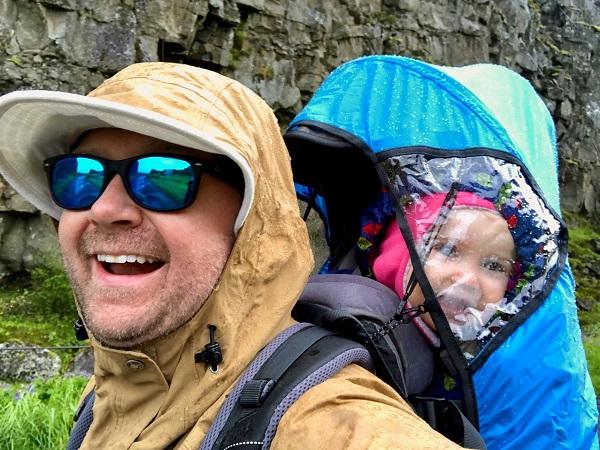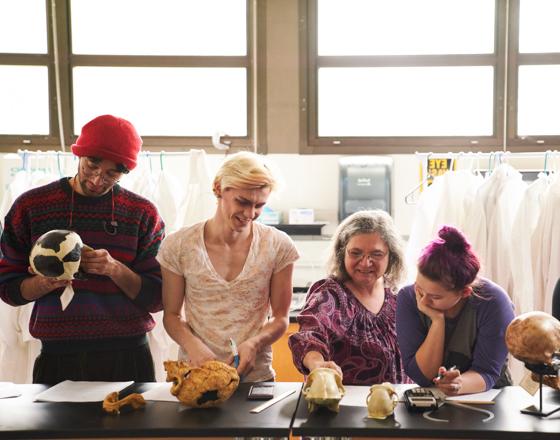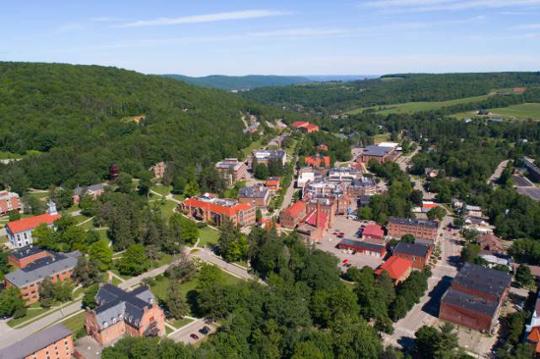
Students working in the biology lab, analyzing fluid containers. Student with gloves weighing substance and mashing it. A professor demonstrating on a centrifuge talking to two students. A sweeping shot of a student analyzing something under a microscope. Students watering plants. Two students outdoors identifying an analyzing plant life.
Bachelor of Arts in Biology
In the Bachelor of Arts in Biology degree program, Alfred University will train you to have a strong, broad foundation in biology while providing numerous opportunities for you to develop the specialized expertise and technical and research skills you need to be competitive in the job market. Biology graduates will be empowered to move into a diverse array of careers, from health-related professions such as medicine, dentistry, and veterinary, to post-graduate study across a range of topics such as biotechnology, ecology, or animal sciences, to employment opportunities such as teaching or biological research.
Foundation and Core:
- BIOL 150 Biological Foundations - 4 credits
- BIOL 211 Cell Biology - 4 credits
- BIOL 212 Principles of Genetics - 4 credits
- BIOL 213 Structure and Function of Organisms - 4 credits
- BIOL 226 Biostatistics - 4 credits
- BIOL 314 Community and Systems Biology - 4 credits
- BIOL 390 Junior Seminar
- BIOL 490 Biology Research Seminar
Take 12 credit hours. Recommend completion of one research intensive course.
- BIOL 300 Topics in Biology - 4 credits
- BIOL 302 General Microbiology - 4 credits
- BIOL 306 Field Techniques in Plant Biology - 4 credits
- BIOL 307 Anatomy & Physiology: Nerves, Muscles, Bones - 4 credits
- BIOL 308 Anatomy & Physiology: Viscera - 4 credits
- BIOL 315 Genetics and Evolution of Populations - 4 credits
- BIOL 320 Toxicology - 4 credits
- BIOL 322 Botany - 4 credits
- BIOL 346 Animal Nutrition - 4 credits
- BIOL 348 Animal Behavior - 4 credits
- BIOL 353 Tropical Ecology - 4 credits
- BIOL 354 Ecology - 4 credits
- BIOL 355 Field Techniques in Plant Biology - 4 credits
- BIOL 357 Conservation Biology - 4 credits
- BIOL 375 Comparative Vertebrate Anatomy - 4 credits
- BIOL 376 Animal Physiology - 4 credits
- BIOL 400 Research Topics - 4 to 5 credits [Research Intensive course]
- BIOL 402 Immunology - 4 credits
- BIOL 405 Bioinformatics - 4 credits [Research Intensive course]
- BIOL 420 Biochemistry: Proteins and Metabolism - 4 credits
- BIOL 422 Biochemistry: Nucleic Acids - 4 credits
- BIOL 425 Physiological Plant Ecology - 4 credits [Research Intensive course]
- ENVS 315 Herpetology - 4 credits
Related Courses. Take all courses; additional courses in math and physics are strongly recommended.
- CHEM 105 General Chemistry I
- CHEM 106 General Chemistry II
- CHEM 310 Basic Organic Chemistry
or 315/316 Organic Chemistry I and II
As a student pursuing the BA in biology, you will complete core courses and select a prescribed number of elective courses related to your personal and career interests. Additional courses in chemistry, mathematics, and physics are required or recommended. All courses taken as part of the Biology major must be passed with a grade of C or better.
In addition to fulfilling the requirements of the BA in biology major, as well as the College of Liberal Arts & Sciences general education requirements, you'll be required to complete the College's First Year Experience Program or Transfer Student Program.
An interdisciplinary approach to education allows students to tailor their studies to their interests, all while strengthening their knowledge base across a range of disciplines. Along with a diverse education in the liberal arts, the BA in biology curriculum facilitates double and co-majors in other disciplines and serves as a solid foundation for many career choices.
In our 4+1 program with the College of Business, biology majors with an interest in business and entrepreneurship may leave Alfred University with an MBA. Students interested in the intersection of biology and materials engineering have the opportunity to minor in biomaterials science. Additionally, many biology majors also earn minors or majors in chemistry.
Students enrolled in the Bachelor of Arts in Biology with an interest in global and human ecology may participate in the interdisciplinary environmental studies program. An interdisciplinary minor in biopsychology allows majors in biology or psychology to understand the interrelationship of physical and physiologic systems. Students in other disciplines can complete a minor in biology or biological anthropology, and our BA in biology majors may have minors in a wide range of STEM and non-STEM fields.
To learn more about AU's major and minor offerings, visit the Undergraduate Majors & Minors page.
All Biology double majors complete a common core and related courses, and will select 12 credits of specialization courses based on their interests. All courses taken as part of the Biology major must be passed with a grade of C or better; transferred courses must have approval from the Division of Biology to receive major credit.
Learn more about Double Majors
Biology Core Courses: Take all from this section
- BIOL 150 Biological Foundations - Fall/Spring
or BIOL 155 Biol. Foundations: Research Project - BIOL 211 Cell Biology - Spring
- BIOL 212 Principles of Genetics - Fall
- BIOL 213 Structure and Function of Organisms - Fall
- BIOL 314 Community and Systems Biology - Spring
- BIOL 226 Biostatistics - Spring
- BIOL 390 Junior Seminar - Fall
- BIOL 490 Biology Research Seminar - Spring
Specialization (elective) Courses: Select 12 credits from the following courses
- BIOL 300 Topics in Biology
- BIOL 302 General Microbiology - Fall
- BIOL 306 Human Pathophysiology - Fall
- BIOL 307 Anatomy & Phys: Nerves, Muscles, Skeleton - Fall
- BIOL 308 Anatomy and Physiology: Viscera - Spring
- BIOL 315 Genetics & Evolution Populations - Spring, even years
- BIOL 320 Toxicology - Fall, odd years
- BIOL 322 Botany - Spring, even years
- BIOL 324 Phage Genomics - Spring
- BIOL 346 Animal Nutrition - Spring, even years
- BIOL 348 Animal Behavior
- BIOL 353 Tropical Biology
- BIOL 354 Ecology - Fall, odd years
- BIOL 355 Field Techniques in Plant Biology
- BIOL 357 Conservation Biology - Spring, odd years
- BIOL 375 Comparative Vertebrate Anat. - Fall, even years
- BIOL 376 Animal Physiology - Spring, even years
- BIOL 400 Research Topics
- BIOL 402 Immunology
- BIOL 405 Bioinformatics - Fall, odd years
- BIOL 420 Biochemistry: Proteins and Metabolism - Spring
- BIOL 422 Biochemistry: Nucleic Acids - Fall, even years
- BIOL 425 Physiological Plant Ecology - Fall, odd years
- ATHT 392 Biomechanics - Spring, even years
- ATHT 393 Physiology of Exercise - Fall, odd years
- ENVS 315 Herpetology - Fall, even years
- ENVS 320 Advanced GIS Applications - Spring
- ENVS 330 Ornithology - Fall, odd years
Related Courses: Take all from this section
- CHEM 105 General Chemistry I
- CHEM 105L General Chemistry I Laboratory
- CHEM 106 General Chemistry II
- CHEM 106L General Chemistry II Laboratory
- Take one additional 300-level Chemistry course
A total of 24 credits is required for the Biology Minor.
You must take one of the following BIOL courses:
- BIOL 150 Biological Foundations
- CHEM 105 General Chemistry I
- Plus at least 16 additional credits of BIOL courses (excluding BIOL 226, 390, 450, 485, and 490), selected in consultation with a Biology advisor
Interdisciplinary Studies Tailored to Your Interests
An interdisciplinary approach to education allows students to tailor their studies to their interests, all while strengthening their knowledge base across a range of disciplines. Along with a diverse education in the liberal arts, the BA in biology curriculum facilitates double and co-majors in other disciplines and serves as a solid foundation for many career choices.
In our 4+1 program with the College of Business, biology majors with an interest in business and entrepreneurship may leave Alfred University with an MBA. Students interested in the intersection of biology and materials engineering have the opportunity to minor in biomaterials science. Additionally, many biology majors also earn minors or majors in chemistry.
Students enrolled in the Bachelor of Arts in Biology with an interest in global and human ecology may participate in the interdisciplinary environmental studies program. An interdisciplinary minor in biopsychology allows majors in biology or psychology to understand the interrelationship of physical and physiologic systems. Students in other disciplines can complete a minor in biology or biological anthropology, and our BA in biology majors may have minors in a wide range of STEM and non-STEM fields
To learn more about AU's major and minor offerings, visit the Undergraduate Majors & Minors page.
Independent Study
Independent study projects in biology provide an opportunity for students to pose original questions based on their interests and formulate responses that may be research-based, literature-based, or the result of a creative endeavor. BA in biology students are encouraged to have fun with their projects and enjoy the opportunity for in-depth study in an area of their choosing.
Students will develop and carry out their ideas with the advice and guidance of a faculty member. The final project will be presented to the Division of Biology in the form of a thesis, poster, oral presentation, or another acceptable format.
Course Credit
The independent study is taken as either BIO 450 (Independent Study) or BIO 485 (Internship in Biology), depending on the degree of independent work.
Funding
Students pursuing a bachelor’s degree in biology may apply for an Alfred Research Grant for Undergraduate Students (ARGUS) to help fund their projects. Faculty may have other sources of funding to support student work as well.
Selected Biology Student Independent Research Projects
- An investigation of prion protein interactions and other causal factors in the development and onset of Alzheimer’s Disease
- The effect of enrichment methods on cribbing in Equus caballus
- The influence of equine conformation on performance
- How to address Toxocara in humans and companion animals as a public health issue
- Assessment of intra- and inter- species interactions and use of space between captive common squirrel monkey, black capped squirrel monkey, howler monkey, and capuchin monkeys
- GMO’s effect on health and the environment
- Investigating the relationship between hair dye and hair tensile strength
- Gender markers in Nepenthes
- Molecular genetics of autofluorescence in Avena sativa
- Color vision in California sea lions (Zalophus californianus)
- Indications of Exhibit Quality based on Captive Felid Behaviors
- Territorial behavior and dominance hierarchies between three species of African cichlids
- Chemotaxis responses to pheromones in cockroaches
- Attempts to establish a cricket colony and future chemotactic studies
- Integrated human health: A review of the integration of complementary and alternative medicine with conventional healthcare
- Behavioral responses to novel objects in North American river otters (Lonta canadensis)
- Learning, imitation, and time-expenditure frequencies in Lontra canadensis
- Manufacturing cockroach pheromones and testing their effectiveness
- The effect of latitude on reproductive behavior and timing in the North American river otter (Lontra canadensis)
- Differences in seasonal reproduction patterns between tropical and temperate squirrel monkey (Saimiri sciureus) populations
- Research in equine nutrition: diet changes in PSSM horse
- Human impacts on extinction and threat of extinction of island avifauna
- Investigation of the presence of the phorid fly Apocephalis borealis and other causes of CCD in honeybee hives of Alfred NY
- Engineering Chimeras to Monitor Multiplex Interactions
- Genetics of Zebrafish
- Zinc finger nucleases: The past and present of in vivo genome editing
- The effects of cigarette smoke on plants
- Integrated human health: a review of the integration of complementary and alternative medicine with conventional medicine
- Microbial community analysis of a human versus a canine oral cavity
- Spore formation by the gram negative bacteria Chitinophaga pinensis
- Antimicrobial activity of silver containing cements
- The synthesis of small molecules to inhibit FabI in the fatty acid synthesis pathway of apicoplast parasites
- Interaction analysis of a putative MafA-like protein and a hypothetical protein with AniA, an anaerobically induced outer membrane protein of Neisseria gonorrhoeae
- Identification of nematode species found in the oat rhizosphere
- Identification of bacteria found in the rhizosphere of oats (Avena sativa)
- Phylogenetic analysis of microorganisms living in streams impacted by acid mine drainage
- Evaluation of microbial community structures and coliform persistence in the Alfred Wastewater Treatment Facility reed bed sludge treatment system
- Microbial community analysis of fungi in oat rhizosphere
- Nematode maintenance and culture
- Novel apparatus for growing and examining plant-microbe rhizosphere relationships
- Microbial degradation of petroleum hydrocarbons within various soil textures
- Biofilm Formation of Neisseria gonorrhoeae: A Sea of Unexplored Possibility
- The effects of minimal fluoride exposure on the uptake of nutrients in agricultural and horticultural plants
- Genetic diversity of American beech and Canadian hemlock in Allegany County
- The Therapeutic potential of Viral-Vector Based, Antigen Specific, Vaccines for Oral Cancer
- Tissue culture and cytogenetics of Amazon water lilies
- Steady State Nitric Oxide Levels in Neisseria gonorrhoeae
- Physiological analysis of Growth Patterns in Two Mutant Strains of Neisseria gonorrhoeae
- Tissue culture of insectivorous plants
- Anaerobic Liquid Culture of Neisseria gonorrhoeae
- An Investigation into the Sources of Fecal Coliforms in the Canacadea Creek
- The chemical basis of autofluorescence of oat hulls
- Analysis of the Role of the Highly Conserved Region in Bacterial Quinoprotein Dehydrogenase Based on Relative Kinetic Studies of Site-Directed Mutation in Escherichia coli
- Oil-degrading Microbes at AU
- Effect of Cranberry Extracts on Helicobacter pylori
- Statistical analysis of body piercings in AU students
- An Investigation of Extremophiles in Extraterrestrial Environments
- Sensitivity of Neisseria gonorrhoeae to Human Serum
Alfred University is committed to making education affordable for all students, which is why AU awarded $25 million in gift aid to our students last year these are awards that don't need to be paid back. In addition, 97% of our students receive some form of financial assistance.
To discover scholarship opportunities and learn about AUs tuition structure, visit the Scholarship page. For more information on cost of attendance, visit the Tuition Cost and Fees page or use the Net Price Calculator tool to determine estimated costs.
The Biology and Biochemistry Division at Alfred University rewards deserving biology students for their progress, performance, and dedication to the field. Eligible students may qualify for the following awards:
Brenda Bernstein Butner Award in Botany
The Brenda Bernstein Butner Award in Botany funds outstanding student research projects on native plants. This award provides a stipend for a semester-long or summer project.
University Advisory Committee for the Health Professions Scholarships
Each year three merit-based awards are given to one sophomore, one junior and one senior student interested in animal or human medicine and who, by their academic, extracurricular and health-related practical experiences, have demonstrated a strong motivation and potential for pursuing a career in a health profession.
Diana Mossip Memorial Scholarship
One of our most treasured scholarships is in memory of Diana Mossip who entered Alfred University in 1994 and was killed in a tragic automobile accident while still a student in 1996. Diana was a National Merit Scholar and a member of the Honors Program. She was majoring in Biology and had planned a career in veterinary medicine. Diana was a member of the Biology Club, assisted with blood drives, and enjoyed living in the Brick Residence Hall.
As an organ donor, Diana provided the gift of life to several people. Her family provides the gift of education by awarding the scholarship annually to two deserving students who are planning future careers in veterinary, human or dental medicine.
| CORE REQUIREMENTS | F23 | S24 | F24 | S25 | F25 | S26 | |
|---|---|---|---|---|---|---|---|
| Biological Foundations | 150 | ✓ | ✓ | ✓ | ✓ | ✓ | ✓ |
| Biological Foundations- Research Project | 155 | ✓ | ✓ | ✓ | |||
| Cell Biology | 211 | ✓ | ✓ | ✓ | |||
| Principle of Genetics | 212 | ✓ | ✓ | ✓ | |||
| Structure and Function of Organisms | 213 | ✓ | ✓ | ✓ | |||
| Biostatistics | 226 | ✓ | ✓ | ✓ | |||
| Community & Systems Biology | 314 | ✓ | ✓ | ✓ | |||
| Jr Seminar | 390 | ✓ | ✓ | ✓ | |||
| Sr Seminar | 490 | ✓ | ✓ | ✓ |
| SPECIALIZATION ELECTIVES | F23 | S24 | F24 | S25 | F25 | S26 | |
|---|---|---|---|---|---|---|---|
| General Microbiology | 302 | ✓ | ✓ | ✓ | |||
| Phage Genomics | 305 | ✓ | ✓ | ✓ | |||
| Human Pathophysiology | 306 | ✓ | |||||
| Anatomy and Physiology: Nerves, Muscles, Skeleton | 307 | ✓ | ✓ | ✓ | |||
| Anatomy and Physiology: Viscera | 308 | ✓ | ✓ | ✓ | |||
| Genetics & Evolution of Populations | 315 | ✓ | ✓ | ||||
| Toxicology | 320 | ✓ | ✓ | ||||
| Botany | 322 | ✓ | |||||
| Animal Nutrition | 346 | ✓ | ✓ | ||||
| Animal Behavior | 348 | ✓ | ✓ | ||||
| Ecology | 354 | ✓ | ✓ | ||||
| Conservation Biology | 357 | ✓ | |||||
| Comparative Vertebrate Anatomy | 375 | ✓ | |||||
| Animal Physiology | 376 | ✓ | |||||
| Research Topics | 400 | ✓ | ✓ | ||||
| Immunology | 402 | ✓ | |||||
| Bioinformatics | 405 | ✓ | |||||
| Biochemistry: Proteins & Metabolism | 420 | ✓ | ✓ | ✓ | |||
| Biochemistry: Nucleic Acids | 422 | ✓ | |||||
| Physiological Plant Ecology | 425 | ✓ | ✓ |
| NON-MAJORS COURSES | F23 | S24 | F24 | S25 | F25 | S26 | |
|---|---|---|---|---|---|---|---|
| Physiology of Aging | 119 | ✓ | ✓ | ✓ | |||
| Introduction to Human Genetics | 130 | ✓ | ✓ |
*Please note this three-year plan represents our "best guess." Offerings may shift in response to student needs and/or faculty staffing.
Upper level requirements and electives are determined according to your career interests and your decision to focus on cell/molecular biology, organismal biology, or ecological biology.
What Can You Do with a Bachelor's Degree in Biology?
Alfred University's bachelor's degree in biology program has an international reputation for producing graduates who are solidly prepared to enter the workforce or continue on to post-graduate study programs. Graduates of the AU's bachelor's degree in biology have gone on to lead successful and rewarding careers as research technicians, animal control officers, biology teachers, falconry experts, and STEM specialists.
According to the Bureau of Labor Statistics, individuals with a degree in biology earn a median annual salary of $65,000. While many workers in this degree field find careers in healthcare, other career sectors include management, life, physical, and social sciences, education and library occupations, and business and finance. A Bachelor of Arts in Biology degree from AU will build a strong foundation that students can build upon in pursuit of their specific career goals.
BA in Biology Student Learning Outcomes
Upon completion of the Bachelor of Arts in Biology program a student is able to:
- Acquire, analyze, and synthesize fundamental knowledge of concepts and principles across all disciplines of biology
- Recognize and use language and principles appropriate to the biological discipline
- Be critical thinkers and articulate original questions
- Communicate fundamental principles as they cross boundaries of traditional biological disciplines
- Effectively communicate information in multiple formats
- Revise and edit work for clarity, consistency, and coherence
- Demonstrate thinking and reasoning appropriate to both concrete and abstract concepts
- Read and discuss current literature
- Conduct research, construct hypotheses and/or research questions, and draw conclusions that connect new knowledge to existing knowledge
- Know how to search and access biological literature
- Perform general laboratory and field techniques competently and safely, including handling of living organisms
- Carefully collect and keep research information (lab notebooks and data sheets)
- Statistically analyze and interpret data
Best Preparation for Graduate Studies
Alfred’s Biology graduates also have been admitted to numerous medical, dental, and veterinary schools as well as programs for physician assistants and physical therapy.
Our graduates are successfully admitted to graduate programs for various disciplines in biology, such as biological science (Auburn University), genome sciences (Washington University), education (Nazareth College), and ecology and evolutionary biology (SUNY ESF). Graduates of the bachelor’s degree in biology program have also gone on to pursue graduate degrees in the health profession. Examples of recent health-related graduate school admissions include:
- University of Florida
- Ohio State
- University of Illinois
- Gannon University
- Cornell University
Alfred Stories
News
Learn how Alfred University's Biology and Biochemistry programs are changing the landscape of learning through the latest classroom technologies, continuous faculty research and hands-on student engagement.
Similar Programs
Students interested in careers in Biology may also consider these other majors and minors:






